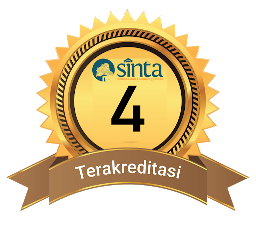Analysis Of Factor Influencing The Chemistry Learning Process At Senior High School 8 Mataram
DOI:
10.29303/cep.v7i2.6526Published:
2024-12-04Issue:
Vol. 7 No. 2 (2024): Edisi NovemberKeywords:
factor analysis, learning process, chemistryArticles
Downloads
How to Cite
Abstract
This research aims to find out what factors influence the chemistry learning process at the Senior High School of 8 Mataram. The type of research used is descriptive qualitative, with the subjects 28 students of class XI MIA 6, 26 students of XII MIA 3, and 2 chemistry teachers. Data were collected using interview techniques with a validated interview guide sheet then worked interactively and carried out continuously until complete and clear where data analysis activities include data reduction, data presentation and conclusions/verification. Data validity was carried out by triangulating sources and time. The results showed that the factors that influence the chemistry learning process are the factors of teachers, students, learning facilities and infrastructure, and the social environment of students at school. There are 2 inhibiting factors that affect the chemistry learning process, namely student factors and learning facilities and infrastructure factors. Student factors that influence the chemistry learning process are readiness, interest and intelligence/ability of students to understand during the learning process. While the learning facilities and infrastructure factor is in the availability of laboratory tools and materials that are not complete and adequate. Teacher factors and the social environment of students at school are not an inhibiting factor that affects the chemistry learning process, because teachers have worked optimally, optimally and professionally in conducting learning. While the social environment of students at school shows a harmonious relationship between students and teachers, students with other students, and students with the school environment both inside and outside the classroom with cool and comfortable school environment conditions.
References
Aleksander, L. (2015). Prestasi Belajar Siswa. Surabaya: Kresna Bina Prima.
Budiman, H., & Aam, H. (2017). Hubungan Antara Kesiapan Belajar dengan Prestasi Belajar Siswa SMK. Jurnal Of Engineering Education. 4(1):49.
Dewi, T., A. (2015). Pengaruh Profesionalisme Guru dan Motivasi Kerja Terhadap Kinerja Guru Ekonomi SMA Se Kota Malang. Jurnal Pendidikan Ekonomi UM Metro. 3(1):27-32.
Emda, A. (2017). Kedudukan Motivasi Belajar dalam Pembelajaran. Jurnal Lantanida. 5(2):175.
Firdaus., & Zam, Z. F. (2018). Aplikasi Metode Penelitian. Yogyakarta: Deepublish.
Kamtinah. (2016). Penilaian Keterampilan Guru dalam Mengelola Kelas Sebagai Upaya Peningkatan Profesionalismen Guru Sekolah Dasar Negeri di Kecamatan Karangayung Kabupaten Grobongan Tahun Ajaran 2016/2017. Jurnal Pendidikan Empiris. 6(2):51.
Karniar. (2020). Analisis Faktor yang Mempengaruhi Hasil Belajar Pelajaran Kimia di SMA Negeri 4 Banda Aceh. UIN Ar-Raniry Banda Aceh. Aceh: Fakultas Tarbiyah dan Keguruan Prodi Pendidikan Kimia.
Kunandar. (2007). Guru Profesional: Implementasi Kurikulum Tingkat Satuan Pendidikan (KTSP) dan Sukses dalam Sertifikasi Guru. Jakarta: Rajagrafindo Perseda.
Marsita, R. A., Priatmoko, S., & Kusuma, E. (2011). Analisis Kesulitan Belajar Kimia Siswa SMA dalam Memahami Materi Larutan Penyangga dengan Menggunakan Two-Tier Multiple Choice Diagnostic Instrument. Jurnal Inovasi Pendidikan Kimia, 4(1), 512–520.
Mattin & Nurhattati, F. (2016). Manajemen Sarana dan Prasarana Pendidika: Konsep dan Aplikasinya. Jakarta: PT Rajagrafindo.
Mauladani, Yuza, H. (2021). Menjadi Guru Kreatif, Inovatif dan Inspiratif. Riau: UNRI.
Nur, Qalbi., T. (2017). Pengaruh Intelegensi, Task Commitment dan Self Efficacy Terhadap Hasil Belajar Matematika Siswa SMA. Jurnal Of Est. 3(1):134.
Putra, Galeh, N., I. (2012). Hubunga n Lingkungan Sekolah, Keluarga dan Masyarakat terhadap Karakter Siswa SMK Negeri Kelompok Teknologi Se-kabupaten Seleman. Yogyakarya: UNY.
Putriana, N. (2015). Pengaruh Lingkungan Keluarga dan Lingkungan Sekolah terhadap Prestasi Belajar Siswa pada Mata Pelajaran Akuntansi di Kelas XI IPS SMA Pasundan 8 Bandung. Jurnal Pendidikan Akuntansi & Keuangan, 3(1), 13.
Sayuto., & Asep. J. (2013). Menjadi Guru Profesional Strategi Kualikasi dan Kualitas Guru Diera Global. Jakarta: Erlangga.
Usman, M., U. (2011). Menjadi Guru Profesional. Bandung: PT Remaja Rosdakarya.
Utama, P. (2018). Membangun Pendidikan Bermatabat: Pendidikan Bebasis Tahfidz Mencegah Stres dan Melejitkan Prestasi. Bandung: CV Rasi Terbit.
Wahab, R. (2016). Psikologi Belajar. Jakarta: PT Raja Grafindo Persada.
Zohrayati. (2019). Karakteristik Penelitian Ilmu Komputer. Yogyakarta: Deepublish.
Author Biographies
Eka Wulandari, Universitas Mataram
Mukhtar Haris, Program Studi Pendidikan Kimia, FKIP, Universitas Mataram
Sunniarti Ariani, Program Studi Pendidikan Kimia, FKIP, Universitas Mataram
License
Copyright (c) 2024 eka wulandari eka, Mukhtar Haris, Sunniarti Ariani

This work is licensed under a Creative Commons Attribution-ShareAlike 4.0 International License.
Authors who publish with Chemistry Education Practice agree to the following terms:
- Authors retain copyright and grant the journal right of first publication with the work simultaneously licensed under a Creative Commons Attribution License 4.0 International License (CC-BY-SA License). This license allows authors to use all articles, data sets, graphics, and appendices in data mining applications, search engines, web sites, blogs, and other platforms by providing an appropriate reference. The journal allows the author(s) to hold the copyright without restrictions and will retain publishing rights without restrictions.
- Authors are able to enter into separate, additional contractual arrangements for the non-exclusive distribution of the journal's published version of the work (e.g., post it to an institutional repository or publish it in a book), with an acknowledgement of its initial publication in Chemistry Education Practice.
- Authors are permitted and encouraged to post their work online (e.g., in institutional repositories or on their website) prior to and during the submission process, as it can lead to productive exchanges, as well as earlier and greater citation of published work (See The Effect of Open Access).






